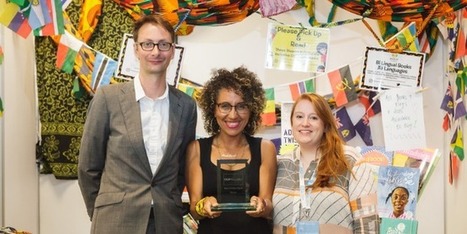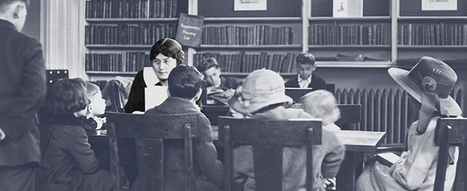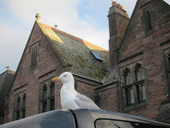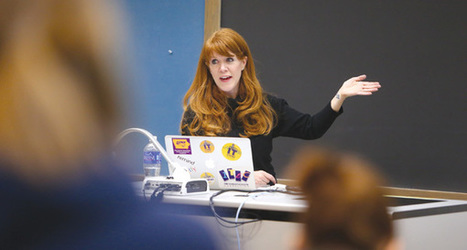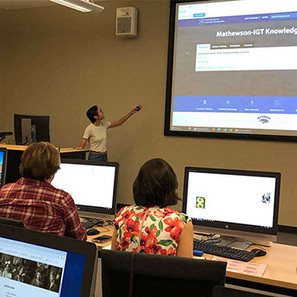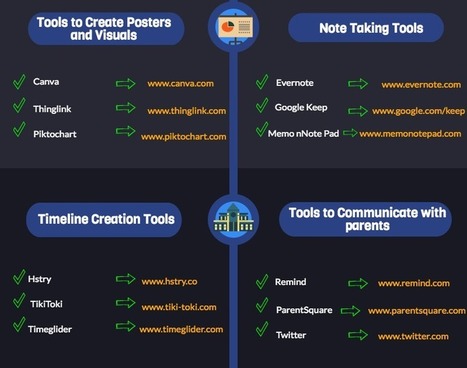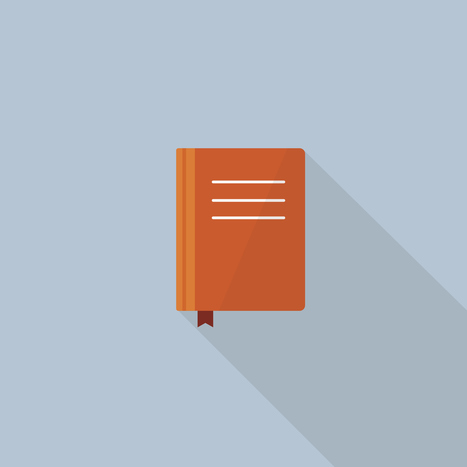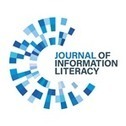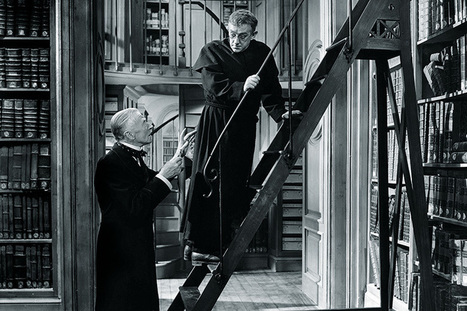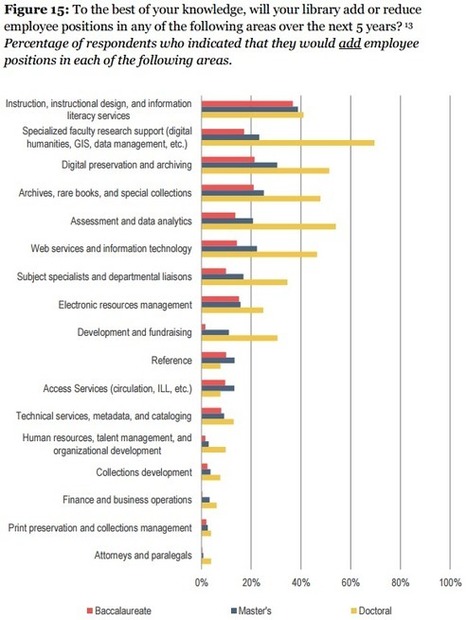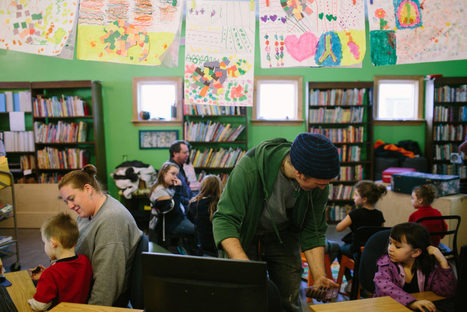 Your new post is loading...
 Your new post is loading...
For almost 20 years, instruction librarians have relied on variations of two models, the CRAAP Test and SIFT, to teach students how to evaluate printed and web-based materials. Dramatic changes to the information ecosystem, however, present new challenges amid a flood of misinformation where algorithms lie beneath the surface of popular and library platforms collecting clicks and shaping content. When applied to increasingly connected networks, these existing evaluation heuristics have limited value. Drawing on our combined experience at community colleges and universities in the U.S. and Canada, and with Project Information Literacy (PIL), a national research institute studying college students’ information practices for the past decade, this paper presents a new evaluative approach for teaching students to see information as the agent, rather than themselves. Opportunities and strategies are identified for evaluating the veracity of sources, first as students, leveraging the expertise they bring with them into the classroom, and then as lifelong learners in search of information they can trust and rely on.
The final network in Universal Design for Learning is the strategic network. Its focus is on how learning takes place. The goal for this network is for learners to be “strategic and goal-directed” (CAST, 2019b). To do this, CAST (2019a) recommends educators provide multiple ways for students to express their learning.
Every individual expresses themselves in different ways. This means they also convey what they have learned in various ways. These variations can be due to physical limitations, language barriers, or different ways of understanding content. When we are working with library users in training sessions, in new hire orientations, or conducting internal staff training, we want to provide many opportunities for each person to showcase their learning. Taking time for individuals to demonstrate what they have learned helps us know that
Hollywood made horror movies specifically for librarians, a typical opening scene might be this: A despondent freshman slumps in his dorm room, struggling to complete his first major research project. The camera pans out to a wide shot, showing the library building next door. Students don’t know how to make proper use of its vast research options.
This came out 6 months ago, but Esther Grassian just highlighted it - there is a useful introduction to Online Educational Resources (OERs) (with lots of links etc.) in the December 2018 issue of Library Instruction Round Table News: Tech Talk: Online Educational Resources by Billie Peterson-Lugo (on pages 5, 9-14)..
While I am delighted to be here, I have to admit that I thought long and hard about whether to accept the invitation to speak today. I am aware that we’ve heard a lot of voices like mine, that voices like mine can drown out other people's voices, and that really it is time for me, for us at CILIP to stop speaking and start listening.
But we also have to be accountable, to our members, to the profession, to society at large. We have to explain ourselves – not to dictate terms but to set out a commitment to change and to learn, and to listen.
Because all of us that hold leadership positions in this sector have to confront the fact that we are where we are because of a system of unseen privilege – a system which lifts some of us up while holding others down. The basis of that privilege is rightly being challenged. We are being challenged, rightly, to reflect on that privilege critically and to think about the impact it has on other people’s right to shape our profession.
As a profession, we aspire to universality – but we have to be critical about what ‘universal’ really means. I don’t want to be complicit in a system that promotes some voices at the expense of others.
When I first saw the Alliance for Excellent Education’s Future Ready Librarians Framework, I was excited to note the inclusion of “Collaborative Leadership” and “Builds Instructional Partnerships” as descriptors of an excellent school librarian. These are two areas of the job that I enjoy the most, so their inclusion only seemed natural to me. I do recognize, however, that some librarians’ strength may lie in other areas of the Framework, like “Budgets and Resources” or “Community Partnerships,” and that coming alongside teachers in an instructional partner role might feel a little intimidating.
Dive Brief:
As books gave way to digital sources of information instantly accessible from anywhere, school libraries and librarians were put under pressure to reinvent themselves, according to eSchool News.
School librarians are still supporting reading, writing and research skills, but with a co-focus on digital literacy as well.
The digital workshop is one 21st century learning opportunity that school librarians are implementing. Students learn coding and valuable social skills, including teamwork.
Growing up, I liked to imagine what it would be like to work in a library. What little I knew about them was what I’d gleaned from movies and TV because my conservative parents never took us to any and only let me read books they purchased from the Bible Book Store. I didn’t know any librarians in real life—outside of the elderly woman who ran our tiny school media center—but I understood librarians were smart and savvy. Cool and collected. They were everything my rowdy, boundary-busting, literature-hating family was not. I envisioned a sweet future for myself sitting behind an elaborately carved wooden desk, surrounded by towering stacks of leather-bound books. I’d read for hours in total silence, vanilla and almond perfuming the air. Pages wafting in a gentle breeze. Nobody around to bother me. With librarianship, I’d finally have solitude.
For the sake of our students, we must embrace the changing role of the school librarian. 2017 was a year filled with makerspaces, student engagement, personalized learning, and more. Here, two seasoned librarians shed light on their biggest lessons learned in 2017 and look forward to the up-and-coming trends for the new year.
There is a free online self-paced course Design for Learning: 21st Century Online Teaching and Learning Skills for Library Workers (D4L) which is "designed to enable library workers to transfer their in-person teaching skills to the online environment. ...The program is comprised of 7 online self-paced modules: Orientation, Foundation, Diversity, Community, Content Creation, Course Management, and Capstone. ... D4L was developed as a partnership between the the South Central Regional Library Council, Syracuse University’s School of Information Studies, and the Empire State Library Network.
The Ithaka S+R Library Survey 2016 examines strategy and leadership issues from the perspective of academic library deans and directors. This project aims to provide academic librarians and higher education leaders with information about chief librarians’ visions and the opportunities and challenges they face in leading their organizations.
In fall 2016, we invited library deans and directors at not-for-profit four-year academic institutions across the United States to complete the survey, and we received 722 responses for a response rate of 49 percent.[1]
Research into practice: evaluation of Skills Hub content and implications for library staff development in the creation of video OERs
Via Leo Havemann
“Being a librarian isn’t a job that ends with a shift,” says Megan M. Cusick, grassroots specialist in the Office for Library Advocacy (OLA) at the America Library Association (ALA). “We’re always building connections in the community and expanding our resource base.”
Those qualities inform school and children’s librarians’ decisions when they change career tracks, as Cusick did, either midstream or after decades on the job. Their skills—tech expertise and engagement with books and learning, often enhanced by a passion for advocacy—position them well for a career shift.
|
The US Association of College and Research Libraries (ACRL) posts recordings of its free webinars. Recent recordings include: - ACR
What would happen if your boss asked you to get information and the information you came back with wasn’t credible? This is a situation many students may find themselves in if they lack the skills they need to decipher between credible sources and “fake news.” For example, sources found through a Google search aren’t always trustworthy. Using or providing sources that aren’t credible could result in very serious consequences.
Librarians do an amazing job at school. They are entrusted with various educational tasks. These include, according to Queen University library, help students with information-related activities, assist students in developing information literacy skills that allows them to navigate and search the web effectively, collaborate with teachers in creating challenging project-based activities, run different literacy clubs, build library collections and many more.
Accessibility is a concern for librarians in digital as well as physical spaces, and we have a responsibility to uphold the Americans with Disabilities Act (ADA). However, regardless of legal requirements, librarians endeavour to make content available to everyone. People with disabilities are no exception. While some of the more complex accessibility issues should be left to instructional technologists and web developers, there are plenty of things that anyone posting content online can do to increase content accessibility. Here are five tips that we have found useful for creating guides, posting handouts in our Learning Management System (LMS), building online tutorials, or similar activities.
Libraries and funding agencies are finally flexing their muscles against journal paywalls. Authors should follow suit. A PERSON COULD BE FORGIVEN for believing 20 years ago that the internet would soon revolutionize academic publishing. With the emergence of the world wide web, it suddenly became possible for academic publishers to disseminate scholarly work at the click of a button — at a fraction of the cost of printing and mailing hard-copy journals. Recognizing the opportunity, many scholars and librarians began to advocate a new, open access model of academic publishing, in which research articles are made freely available online to anyone who wants them, not just affiliates of colleges or universities. The result would be a true online “public library of science” — which, as it so happens, also became the name of one of the first publishers to embrace the model. As a new librarian in the early 2000s, I believed passionately in the cause of open access and worked hard to bring it about. But almost two decades later, the movement has made only slight gains at the margins, and the traditional subscription-based model remains firmly entrenched in academia. For the university libraries who bear most of the subscription costs, it is as though the internet revolution never happened: Since 1986, research library expenditures have grown at more than four times the rate of inflation, with journal prices showing the greatest price jumps of all.
I’ve been mulling over writing something on this topic for some time now, but I really wanted to wait until there were some substantial, practical things that I can point to. However, in recent weeks I’ve increasingly been approached about work in this area, what I’ve learnt and what I can share. Rather than tap out roughly the same email to different people in different places, I thought maybe I should write up my reflections on discussions I have had so far, because I think as much as anything it helps me to reflect on what I have learnt since first engaging in these discussions. Also, I worry about the somewhat zeitgeisty nature of the topic and I really wanted to nail down a few
As education technology continues to develop at a breakneck speed, it forces us to reimagine the education process from top to bottom on a daily basis. Edtech may change how we perform a given task, but it often leaves basic roles intact. Teachers still teach. Learners still learn. This is no less true with libraries and librarians. I recently sat down with Rachel Cobb, a librarian at the City of Wolverhampton College Study Hubs. Besides several other roles and accomplishments, she also runs a blog, Librayray.
The Journal of Information Literacy publishes innovative and challenging research articles and project reports which push the boundaries of information literacy thinking in theory, practice and method, and which aim to develop deep and critical understandings of the role, contribution and impact of information literacies in everyday contexts, education and the workplace.
It is still unusual for librarians to go on to run universities or other major institutions.
Yet there are examples. In the UK, David Baker served as principal of what is now Plymouth Marjon University from 2003 to 2009. Alison Allden recently retired from a role as chief executive of the Higher Education Statistics Agency. So what are the key lessons for librarians who want to influence the strategic directions of their institutions and even move into senior management themselves?
Invited presentation given at the 8th International Conference on Qualitative and Quantitative Methods in Libraries by Sheila Webber on 26 May 2016, at Senate House, London, UK
Study finds library directors are moving forward with big reorganizations plans, but they also may be struggling to communicate those plans to administrators and faculty members.
Unfettered access to information and news is essential for learning—but it can also be a hazard when learners lack the right tools for parsing that information.
Nobody knows this more than librarians.
|

 Your new post is loading...
Your new post is loading...
 Your new post is loading...
Your new post is loading...









